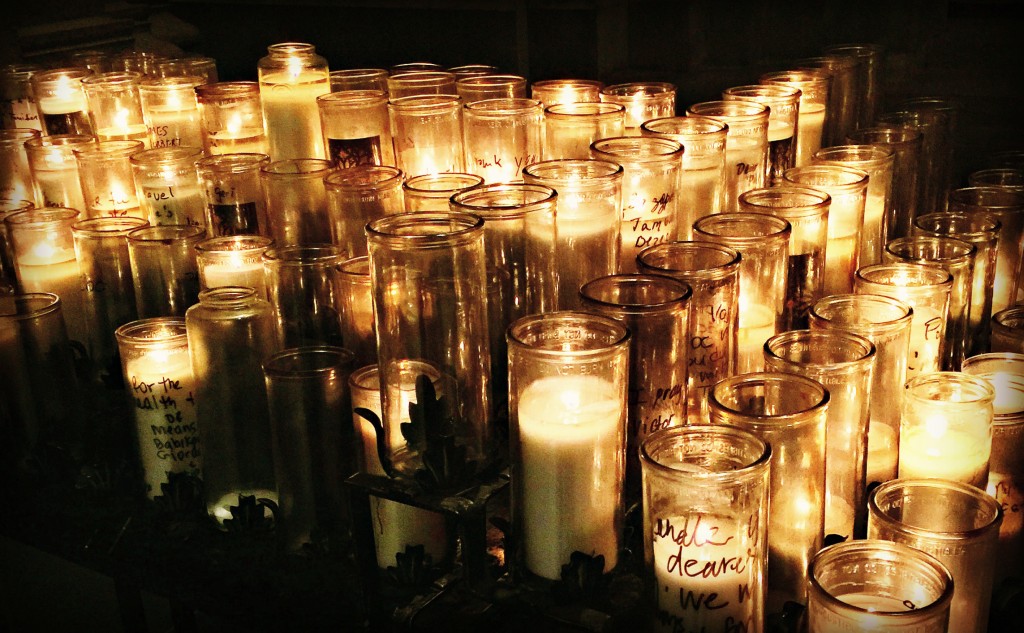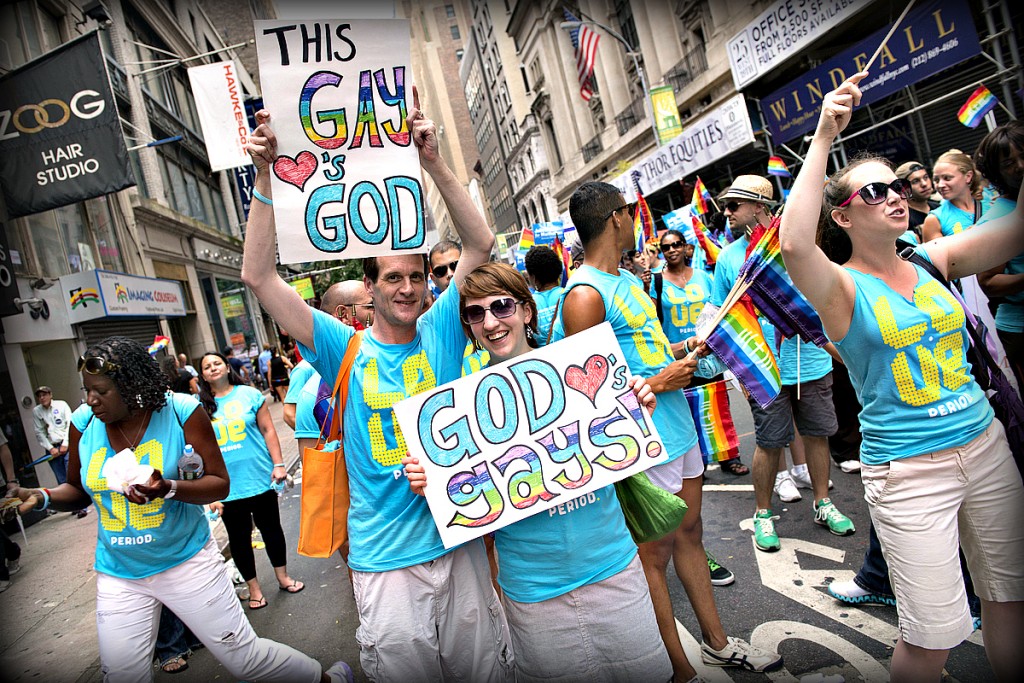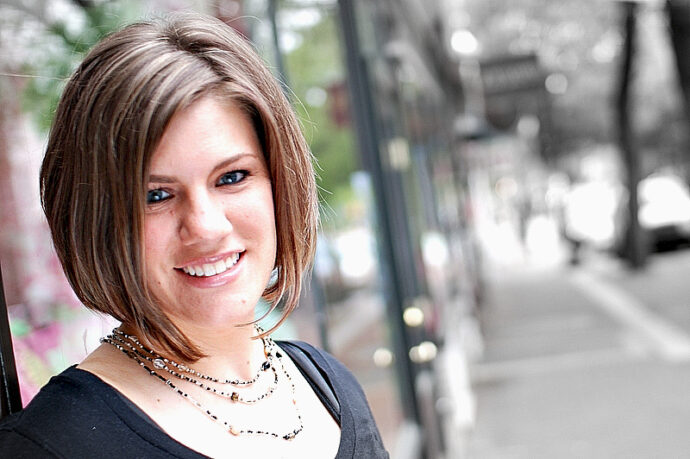“Millennials aren’t looking for a hipper Christianity,” author Rachel Held Evans says in her new book Searching for Sunday: Loving, Leaving, and Finding the Church, “we’re looking for a truer Christianity, a more authentic Christianity.”
Evans found the kind of Christianity she was looking for but it wasn’t hidden amidst the droves of hipster-gimmick evangelical/emergent congregations with fair trade coffee bars in the lobby of their reclaimed industrial spaces and Sunday-night-back-of-a-dive-bar worship/open-mic services. Instead, Evans, 33, discovered a fresh expression of true, authentic Christianity in a, perhaps, unlikely place — the ancient sacraments of the liturgical church.
Evans and I recently had a chance to talk about Searching for Sunday, finding new life in age-old traditions, and her hopes for the future of the Church with a big C.
(The following transcript has been gently edited for clarity and length):
How did you come to write Searching for Sunday?
I knew that finding a church and understanding our place in church was really important to my readers on social media, so I knew I wanted to write about that. But my own experience of church was so fraught, personal, and important to me that I was afraid to write this book and explore this territory. But sometimes the topic you’re most afraid to confront is the most important for you to confront, so I felt it was time.
I thought maybe by writing through my church experience I would come to some peace and resolution about it myself. I wrote it for my readers, but also for myself to try to help me make sense of my own experience.
When [I decided] to arrange the book around the sacraments, I felt like I had some direction. Telling my church story is tough but I can talk about my baptism and what the means. Talking about the role of church in millennials’ lives —that’s huge. I can’t do that, but I can talk about the role of confession or the anointing of the sick or communion. Then, it all just came together and I felt like I could tell my story and other people’s story as well through that imagery.
It was the sacraments that both brought me back to church and helped me articulate my church story.
How are millennials identifying with the sacraments, when most evangelical churches don’t place much emphasis on them?
Even in churches that are not highly sacramental or use that language, we do see some presence of the sacraments in pretty much every community of faith. If it’s a functioning, living, breathing faith community there will likely be sharing of food, which is communion at its heart.
It doesn’t have to look like an Episcopal service — every Sunday being handed the wafer. Communion can look like an impromptu gathering around a table,sharing their lives together, or a food pantry. Even churches that don’t use the word sacrament, I think most of them practice these sacraments in some way.
The kind of Christianity you describe in the book is a place where people are free to be who they are, wounds, scars, warts and all. Unfortunately that’s not the experience many people have in evangelical and mainline churches today. How can we help churches become the kind of genuinely welcoming, intimate communities so many people crave?
You’re a lot more vulnerable if you think of church as a place where you tell each other the truth or you think of it more as a recovery group and less as a country club. In that country club model there’s some security. Everybody knows what their role is and there’s rules and if you play by them everything is fine and you don’t really have to bring your baggage to the table you can leave it behind. I don’t think it’s a sustainable security or that it’s really the church.
Especially as religion in America changes and the demographics are changing and people aren’t really going to church anymore, I think it’s more important than ever to get down to what a faith community is supposed to be. Again, I think the sacraments give us some guidance in that way. The church has always been practicing communion. What does that mean in our culture and our lives? What does it mean to practice confession and baptism and its significance?

Votive candles (some marked with names of those for whom prayers are being offered) flicker in the nave of New York City’s Episcopal Cathedral of St. John the Divine during an evensong service in December 2014. Photo by Cathleen Falsani.
It’s not about trying to come up with some new, hip way (like fog machines) to get the young kids to come to church. It’s not about trying to make Christianity hip or put coffee shops in the lobby. That’s fine but I don’t think that’s what makes a church a church or what will ultimately make people disciples of Jesus. It’s that stuff we’ve been doing for 2,000 years, which is confessing our sins to one another, telling each other the truth, sharing our meals with one another, sitting with each other in the midst of pain and anointing even suffering as holy.
We don’t have to reinvent the wheel on this, instead we have to explore what all this means in our context….I think more and more we have to start gauging our success by something other than how much money is coming in or how many people are showing up. Success can’t look like that anymore and maybe that’s a good thing.
Maybe all the waning numbers will force us to ask, “What does it mean to be a successful church?” I think it means practicing those sacraments and creating that community.
How did you get started blogging and are you surprised by the immense community of followers you’ve amassed over the years?
I started because I always wanted to write a book. I was a writer even as a kid. This is all I ever wanted to do, so I was encouraged to start a blog by my agent and my husband who said it was the best way to build a following so I could start writing for a living. So it was really just a practical thing, but then it evolved into this whole community of people. It ended up being its own sort of animal that has provided great opportunities and conversations.
But sometimes I feel like my life is very public and people make a lot of assumptions about me because of a Tweet or comment here and there. It’s really good but can also be tough place to work out your faith and your questions about faith.
When you’re aware of your history… you start to ask yourself if we’re still using the Bible to justify violence, cruelty, and exclusion of LGBT or to justify some of the racism or other things that plague our society…
Early on it was nice because I could write and not have everything figured out, but now there’s more pressure, I feel, for me to write posts where I have more figured out. That’s not really me, so I’m in a bit of a writing crisis trying to figure that out. I kind of miss the days when I could just work it out. Now, with a couple of books out there, people are starting to treat me the way they treat pastors and I don’t like that.
The community on the blog helped make me the writer that I am but I’m in this space now where I’m uncomfortable with the pedestal people put me on and the joy people seem to have in tearing me down a little bit. I can’t be that person with all the answers, but it’s crazy how people expect that of you.
In Chapter 10 you talk about the violence that Christianity has perpetrated throughout history and it reminded me of a recent speech by President Obama where he basically made the same point. Why did you feel the need to talk about the violent past of Christianity?
The criticism of Obama was surprising. I thought, “Isn’t this just a fact that horrible things have been done in the name of Christ and horrible things have been done by Christians?” To me, acknowledging that is important for understanding the present. It’s just being decent people to acknowledge that things have been done in the name of Christianity that are violent. We have a corporate responsibility to confess that and own that so we don’t do it again or are aware of how we may be doing it presently.
When you’re aware of your history and how the Bible, for instance, has been used to justify things like slavery, you start to ask yourself if we’re still using the Bible to justify violence, cruelty, and exclusion of LGBT or to justify some of the racism or other things that plague our society…. There’s so much security in thinking of America as this Christian nation, founded upon Christian principles that justified all of our decisions and makes us feel better about our patriotism and allegiances. I think there’s a security in thinking of Christians as people who have always been in the right. Then you can be assured that you are also, presently, in the right.
That’s a dangerous way to look at it because there are few things more dangerous than someone convinced they are always right, or that their people or their country or their religion has always been in the right. Most of us are a mix of sinner and saint and most of our religions are a mix of good and evil and that’s just reality. I don’t think there’s anything wrong with acknowledging that.
You were a keynote speaker last year at the Gay Christian Network conference. What did that experience mean to you?
What was so powerful about the GCN conference was just worshiping with a whole room full of people, many of whom had been kicked to the curb by the church. They were being church with one another in a way that I had never experienced before. There was so much grace and forgiveness and room for people coming from different experiences and convictions. It wasn’t just because they were gay, but because there was so much grace. You’re with people who have been hurt by the church and yet still want to be part of this community, to gather around the table and break bread. They still want to confess and tell the truth, heal and anoint.

Pro-LGBTQ Christian group Believe Out Loud marched with the Collegiate Churches of New York & Intersections International to spread the message of God’s expansive love at the2013 NYC Pride March through one simple slogan: “Love Period.” Photo by Angela Jimenez via Creative Commons/Flickr.
Is that what you hope church will be like in the future?
Yes. What I wrote in the book is that LGBT people have a lot to teach Christians about sexuality and culture, but also how to be decent Christians. I had already committed to being a good ally, but what the conference changed for me is that I am not looking to people like Justin [Lee, founder of the Gay Christian Network] or other leaders in the LGBT community to be just teachers to me about sexuality. I’m looking to them to be teachers about what it means to be a Christian. It’s hard to storm out of your church because you don’t like how the worship is going when you know people who have stuck with church even when they’ve been called horrible names and treated terribly. That challenges me.
You still have hope for Christianity?
I do and I always will, I think. I get frustrated sometimes and I get angry and cynical, but I still believe that there are healing properties in breaking the bread of communion together, in baptism declaring that someone is a beloved child of God. I still think there is power in anointing the sick and acknowledging that suffering can be holy.
In all of these sacraments, I still feel like they are important and they pull us into community and that community is important. All the theology and all the stuff we’re supposed to believe and all the politics and drama makes it hard sometimes, but at the end of the day, there’s still something powerful about those sacraments and a community coming together to practice them.





